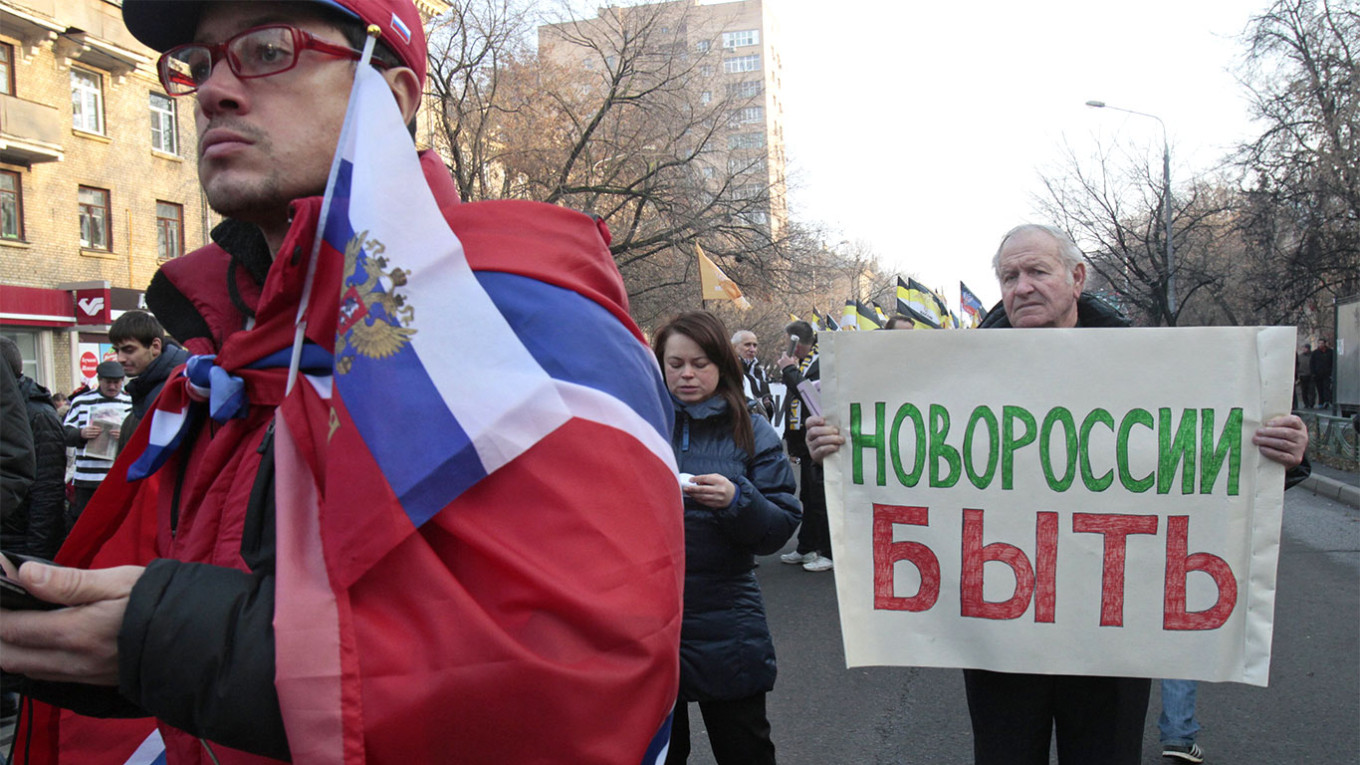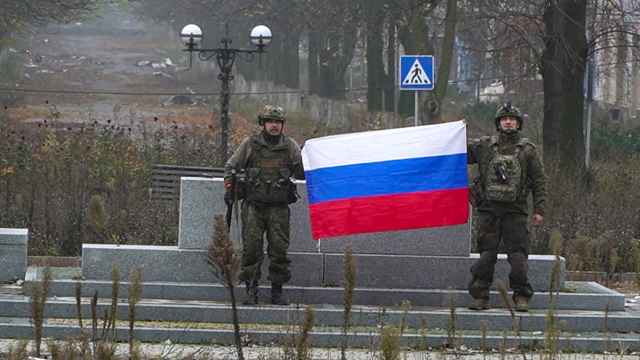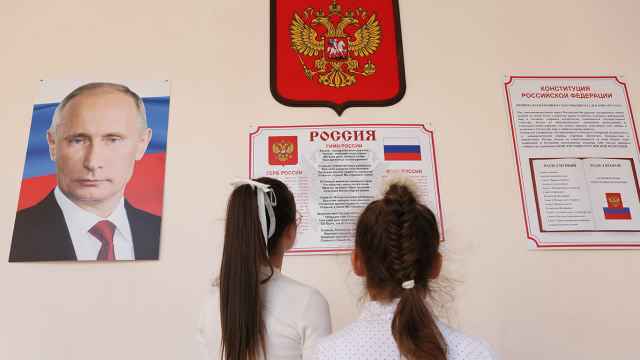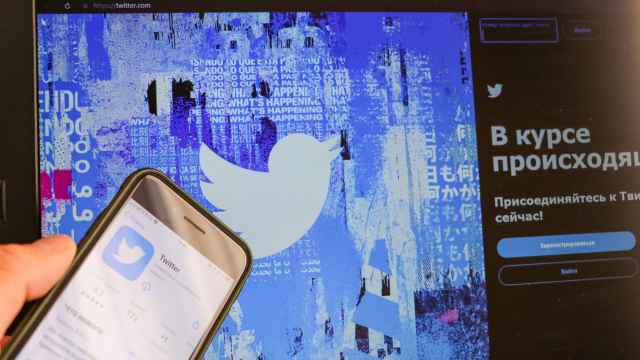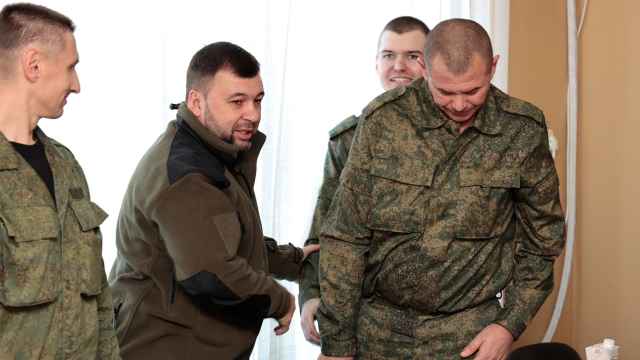It is widely assumed that Russia possesses unparalleled powers of manipulation, and that its ubiquitous propaganda is wreaking havoc on public opinion around the world.
In reality, however, Russian propaganda is far from the sophisticated machine it is made out to be. To see why, it is useful to look back on how its two proxies in Ukraine, the so-called People’s Republics of Donetsk and Luhansk, botched every opportunity to justify their existence.
The Russian-Ukrainian war started in early 2014 with the annexation of Crimea and the emergence of these People’s Republics. The “anti-terrorist operation” Ukraine’s interim government launched to drive out the insurgents was more or less successful until Russia began to pour additional military and financial resources into Donbas, leading eventually to an uneasy ceasefire, with swaths of the region remaining under the separatist control. This provided the new Donbas leadership, consisting mostly of two-bit scam artists, small-time local gangsters, and an occasional committed ideologue, with the opportunity to make the case that Donbas did not belong with Ukraine.
Initially, propagandistic efforts in this direction were ideological. Pavel Gubarev, a Ukrainian-born former member of a neo-Nazi paramilitary group, proclaimed the State of Novorossiya at a congress held in Donetsk in May of 2014. Novorossiya, which means “New Russia”, refers to Ukrainian territories that were previously part of the Russian Empire. The concept has existed since the 1800s, but because it was never popular it lacked the necessary potency to be a replacement ideology for the modern conception of the Ukrainian nation.
Nonetheless, according to Gubarev, the State of Novorossiya would represent “not only the liberation from the yoke of a fascist junta [i.e., the new government in Kyiv], but also the construction of a new, truly fair, scientifically and technologically developed state”.
However, despite support from the well-known far-right ideologue Aleksandr Dugin, Gubarev’s pet project died a whimpering death after the downing of flight MH17 by Donetsk-based insurgents in July 2014. Gubarev himself narrowly survived a series of assassination attempts and left the Donbas political scene soon after.
With Gubarev gone and the MH17 disaster rendering the Kremlin unsure how to proceed with the political future of the Donbas Republics, power fell into the hands of Igor Plotnitskiy in Luhansk and Aleksandr Zakharchenko in Donetsk. Neither man had the gift of gab but possessed enough brawn to carry out the Kremlin’s instructions. However, Moscow remained non-committal in providing justification for why the Republics should see themselves as separate from Ukraine.
Ideological projects such as Novorossiya were off the table until the Kremlin figured out what to do. This meant that the Republics’ leadership was free to speak ill of Ukraine and the “Kyiv Regime” with great enthusiasm. Eventually, Moscow’s answer came in the form of annexation in September 2022.
As part of my research, I analyzed about 80,000 news articles published by separatist media outlets between 2014 and 2018, many of which repeated familiar tropes: that the Euromaidan revolution as a fascist coup by the CIA, the US as an evil puppet master, and Ukraine as an oppressive, genocidal state.
The objective was to delegitimize Ukraine’s new government and sow division, hoping especially to convince Russian-speaking Ukrainians that there was no future for them in Ukraine. This effort failed: studies show that the Euromaidan revolution and the subsequent events catalyzed a cohesive, civic Ukrainian identity, rather than splitting society apart.
What was less clear was what identity should replace this now-enemy. Here, neither the Kremlin nor the Donbas leadership had any idea how to proceed. The Donbas region has a long and storied history, having been fiercely autonomous since it was first settled in the 16- and 1700s. Hiroaki Kuromiya, a well-known historian of Donbas, described the region as the “last frontier of Europe” not only due to its location on the outer edges of the European map but also because it was the least amenable to European cultural and political influence.
As it developed into the economic motor of the Russian Empire (and later the Soviet Union) due to its abundant natural resources (mainly coal), Donbas became a haven for entrepreneurs, but also anarchists and criminals. On top of this, the Cossacks who long ruled the region provided its residents with a source of identity to fall back on when faced with the turbulent politics of the nineteenth and twentieth centuries.
All of this indicates that the Donbas leadership had a reservoir of identity narratives at its disposal to build ideological support, but let it go to waste. When analyzing the aforementioned articles by separatist news outlets, I found no coherent story about who the separatists were and who they were opposing. A few haphazard attempts were made, but if anything these were more silly than serious.
For example, in February 2015, the legislature of the Donetsk People’s Republic adopted a memorandum declaring itself the spiritual successor to the so-called Donetsk-Kryvyi Rih Soviet Republic (DKR), which existed as a self-declared Soviet Republic for about 40 days in February and March 1918, before being incorporated into the Ukrainian SSR. However, despite political leaders in both Donetsk and Luhansk waxing poetic about the supposed historical continuity between the DKR and the present day, the project never went anywhere. It was rarely – if ever – mentioned in media output or official communications.
In another example, Aleksandr Zakharchenko (the head of the Donetsk People’s Republic until his ouster in 2018 by way of a car bomb) held an unexpected press conference in July 2017, declaring the Ukrainian state null and void. Instead, he proclaimed, Ukraine would henceforth be called “Malorossiya” (Little Russia), a term that was sometimes used for the Cossack Hetmanate in Tsarist times. In Zakharchenko’s mind, this could serve as a basis for building an identity disconnected from Ukrainian nationhood. He claimed to have support from representatives from every region of Ukraine (except Crimea), as well as his own colleagues in Donetsk and Luhansk.
This was a lie, or at least a comical exaggeration. The so-called representatives from across Ukraine were Zakharchenko’s personal friends, and even his colleagues reacted with disdain rather than enthusiasm. The Kremlin itself was also caught off guard by Zakharchenko’s sudden unwillingness to follow their instructions, and is alleged to have been involved in his assassination in a Donetsk café about a year later.
The Kremlin and its operatives in Donbas took propaganda very seriously, but failed to make it work. Not only were few Ukrainians convinced that their new government in Kyiv was full of fascist CIA puppets, but the separatists’ haphazard and clumsy nature of their efforts to present an alternative to Ukrainian identity backfired.
The Kremlin bought into its own propaganda so much that it believed many Ukrainians would join the invading Russians in battle. The overwhelming lack of support among the very people it professed to come to save should make it realize that Ukrainians have little appetite for returning to the Russian fold.
A Message from The Moscow Times:
Dear readers,
We are facing unprecedented challenges. Russia's Prosecutor General's Office has designated The Moscow Times as an "undesirable" organization, criminalizing our work and putting our staff at risk of prosecution. This follows our earlier unjust labeling as a "foreign agent."
These actions are direct attempts to silence independent journalism in Russia. The authorities claim our work "discredits the decisions of the Russian leadership." We see things differently: we strive to provide accurate, unbiased reporting on Russia.
We, the journalists of The Moscow Times, refuse to be silenced. But to continue our work, we need your help.
Your support, no matter how small, makes a world of difference. If you can, please support us monthly starting from just $2. It's quick to set up, and every contribution makes a significant impact.
By supporting The Moscow Times, you're defending open, independent journalism in the face of repression. Thank you for standing with us.
Remind me later.



